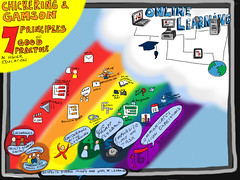Create your own mind maps at MindMeister
What a busy week. From website evaluation to creating mindmaps, Intro to Publications has been busy.
Initially, IRIS: (Information and Research Instruction Suite for two year colleges) provided the information that I used for my students to discuss website evaluation. My students really enjoyed looking at fake websites and trying to identify if the sites were real or not. We discussed that knowing whether or not the information was true is extremely important academically and professionally.
My favorite website to use for evaluation is GenPets. It is a great site that can be confusing if students don't look for the information that states the website it the product of an artist.
Students are continuing to use Michael Clay Thompson's Magic Lens as a basic structure for grammar instruction. I am wanting to develop a consistent level of knowledge among our freshmen so that English 9 will be less about catching-up and more about implementation. Here's a snapshot of our student work.
I am optimistic that creating a baseline of information will benefit our students when discussing writing.
Additionally, this week we integrated the fabulous Digital Driver's License website. I am using this as an extension tool for our digital literacy curriculum. DDL is an interactive website that uses multimedia to discuss many digital citizenship topics, and I recommend it to anyone concerned about digital literacy.
 |
| DDL; Available DDL. |
Finally, I have decided to really incorporate more editing procedures with our blog writing. Although many students have great ideas and want to discuss them, it is difficult for readers to understand with the errors that go unnoticed.
As a rule, students have to have a partner read their work and point out any inconsistencies. Students then have to read their work out loud to themselves so that they can hear any problems before publishing. I'm hoping this focus on revision will encourage students to read their work and think about what they write rather than considering the first draft a publishable version.
I also created three basic outlines to help students reorganize their blog posts this week. Many had difficulties transitioning from a journal style to a more formal format.
Beyond the academics, classes are going extremely well. Students appear engaged and excited to learn new technology. I only wish that my own college classes were as different.


